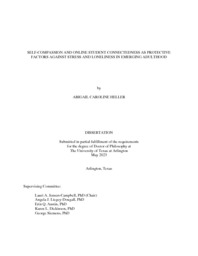| dc.description.abstract | The current state of US youth and emerging adult mental health is described as a crisis that the COVID-19 pandemic has further exacerbated (US Office of the Surgeon General, 2021). This dissertation examined whether daily hassles and COVID-19 pandemic-related stress were related to negative psychological and physical health outcomes in emerging adulthood. Additionally, the current study aimed to examine loneliness as a mediator of the relationship between stressors and physical and psychological outcomes in adolescents. More importantly, this study examined the protective roles of self-compassion (i.e., how emerging adults treat themselves during hard times; Neff, 2003) and online student connectedness in these relationships. Emerging adult college students taking classes solely online (N = 214) completed an online survey measuring demographics, self-compassion, online student connectedness, daily hassles, COVID-19 stressors, and loneliness. Participants also answered questions about health outcomes such as depression, anxiety, perceived stress, life satisfaction, sleep quality, and physical health. Results of confirmatory factor analyses showed that self-compassion was best conceptualized as having two factors (i.e., a positive factor and a negative factor). In the moderated mediation analyses conducted, stressors predicted adverse health outcomes with the exception of low life satisfaction. Significant indirect effects suggested that loneliness was a mechanism at least partly responsible for the relationships between stressors and health. The negative factor of self-compassion (i.e., uncompassionate self-responding; USR) changed the relationships between (1) loneliness and perceived stress, (2) loneliness and depressive symptoms, and (3) loneliness and life satisfaction, such that low USR protected individuals from the negative influence of loneliness on such outcomes. Both factors of self-compassion (i.e., USR and CSR) influenced the indirect effects of stressors on health via loneliness. Online student connectedness did not change any direct relationships or many indirect relationships in the model; however, the indirect relationship between stressors and physical health via loneliness was significant at high and mean online student connectedness, but not low levels, which was contrary to expectations. Additionally, both factors of self-compassion as well as online student connectedness predicted health outcomes directly, while only USR and online student connectedness predicted health outcomes via loneliness. Findings of the current study draw attention to the importance of loneliness, self-compassion, and online student connectedness as targets for intervention to prevent adverse health outcomes in emerging adults. | |


